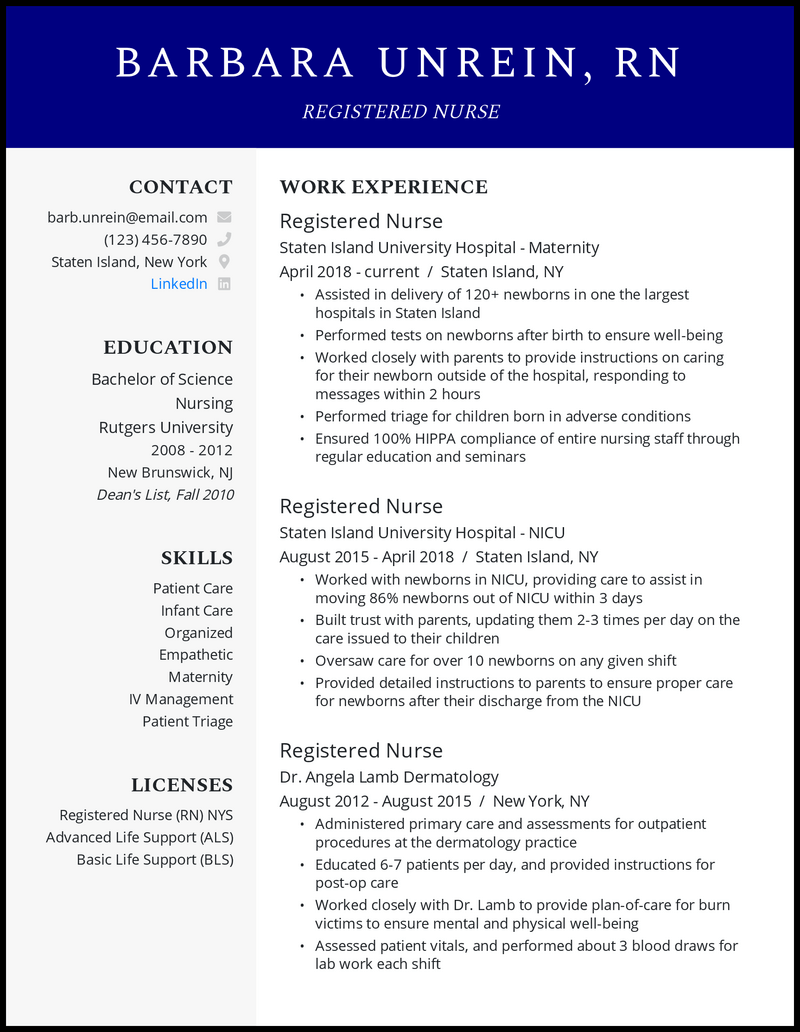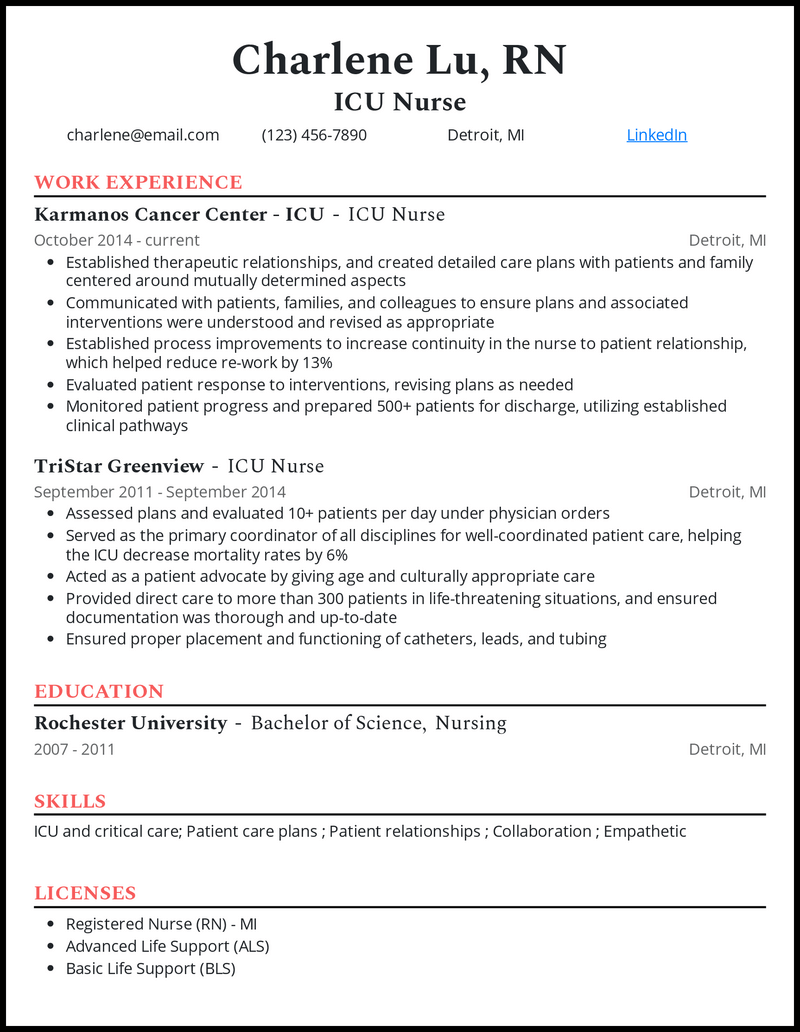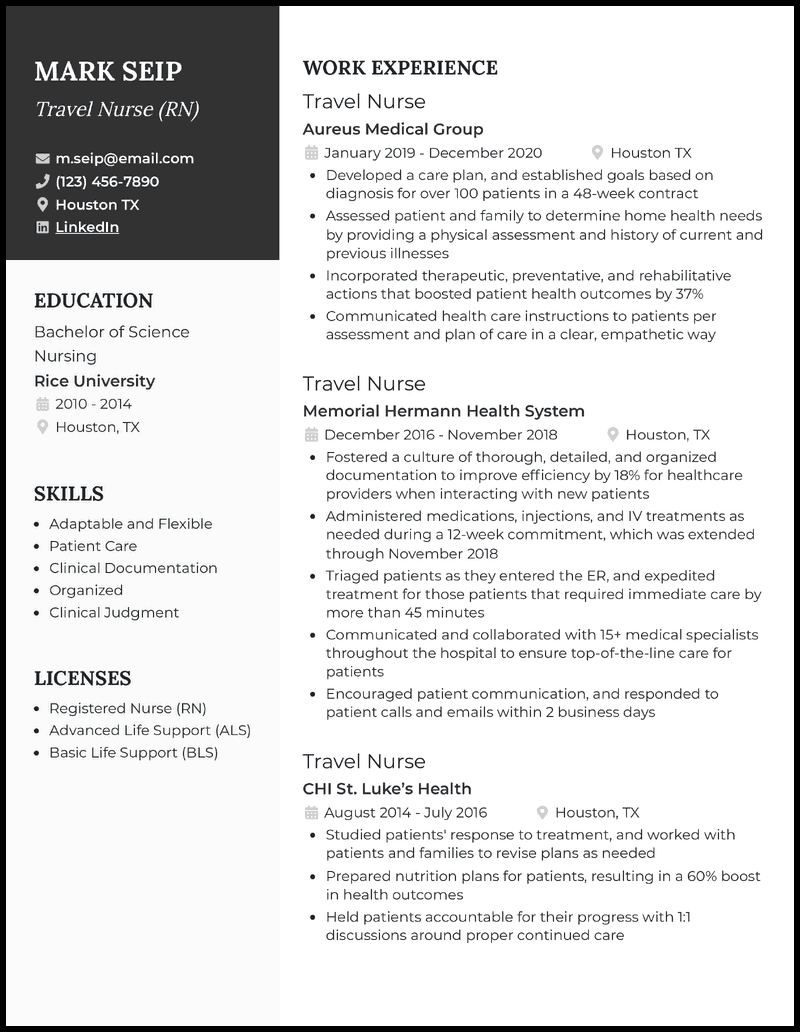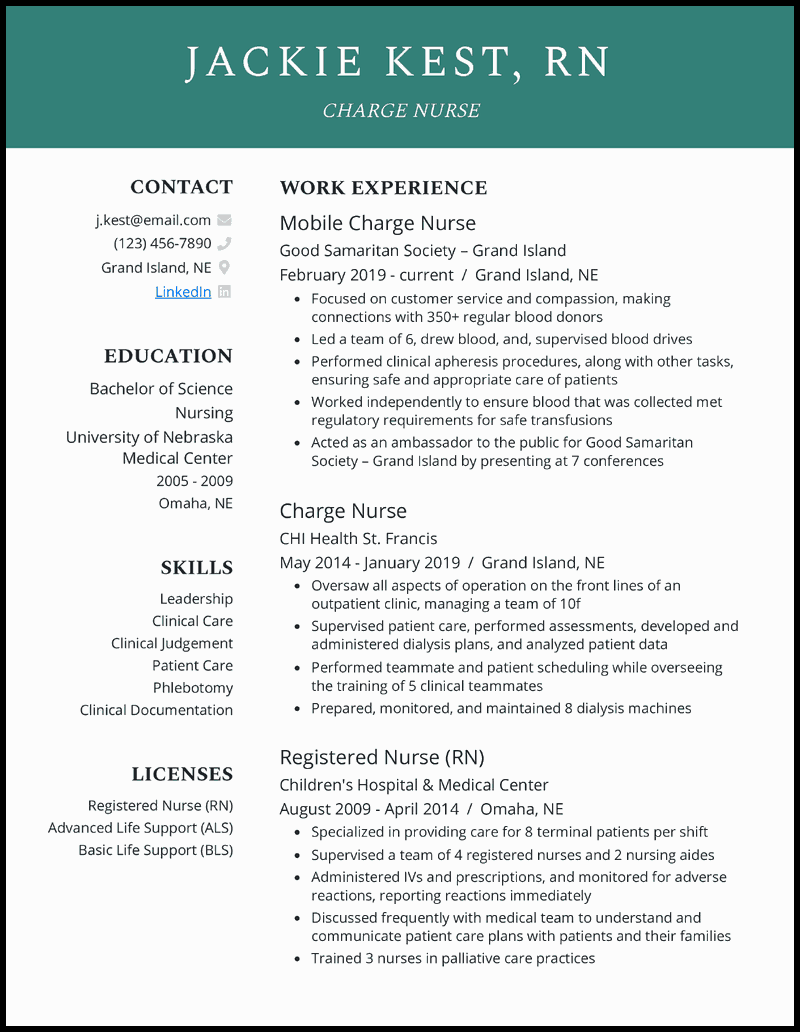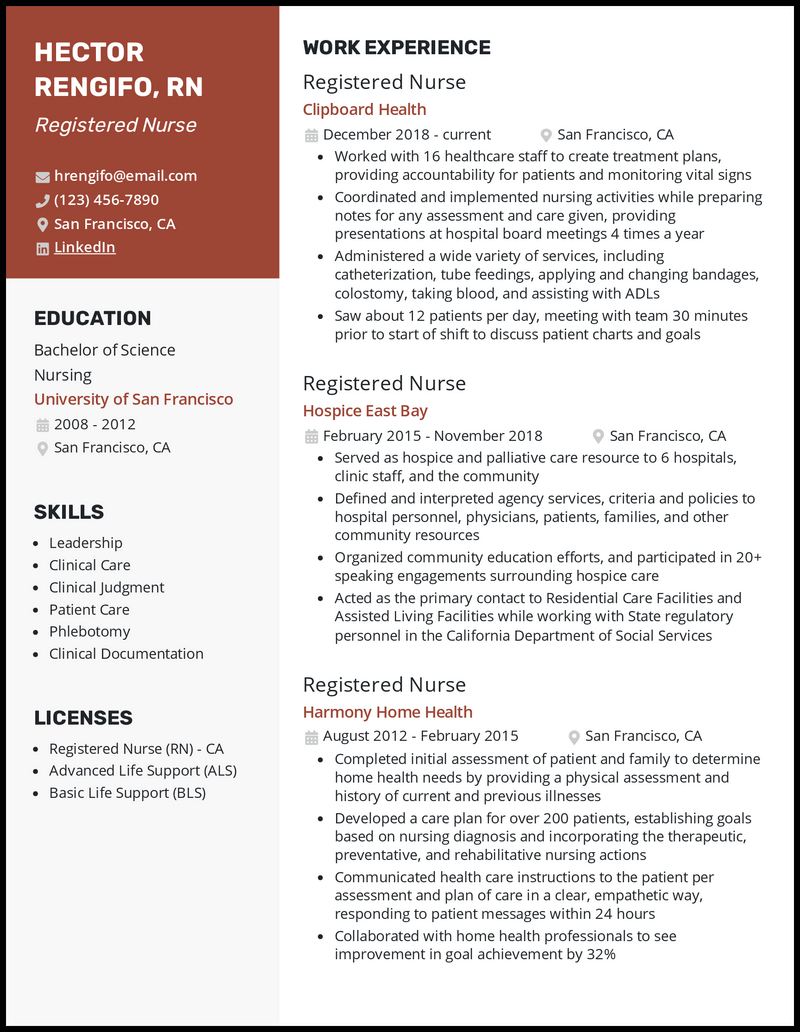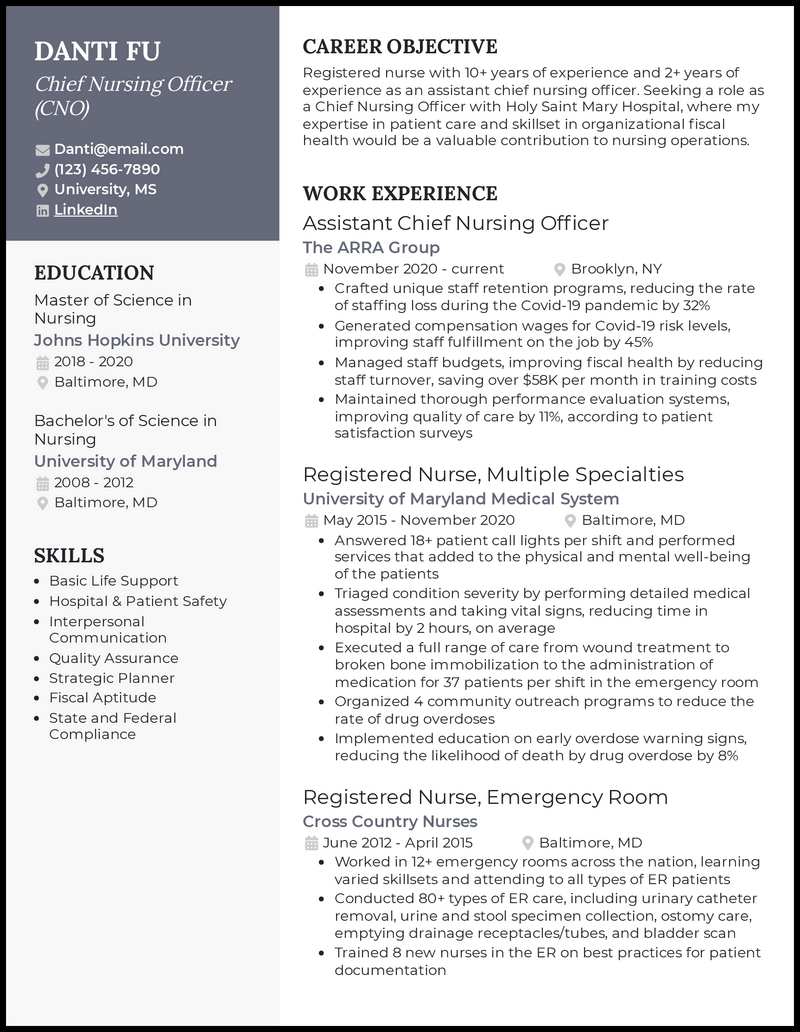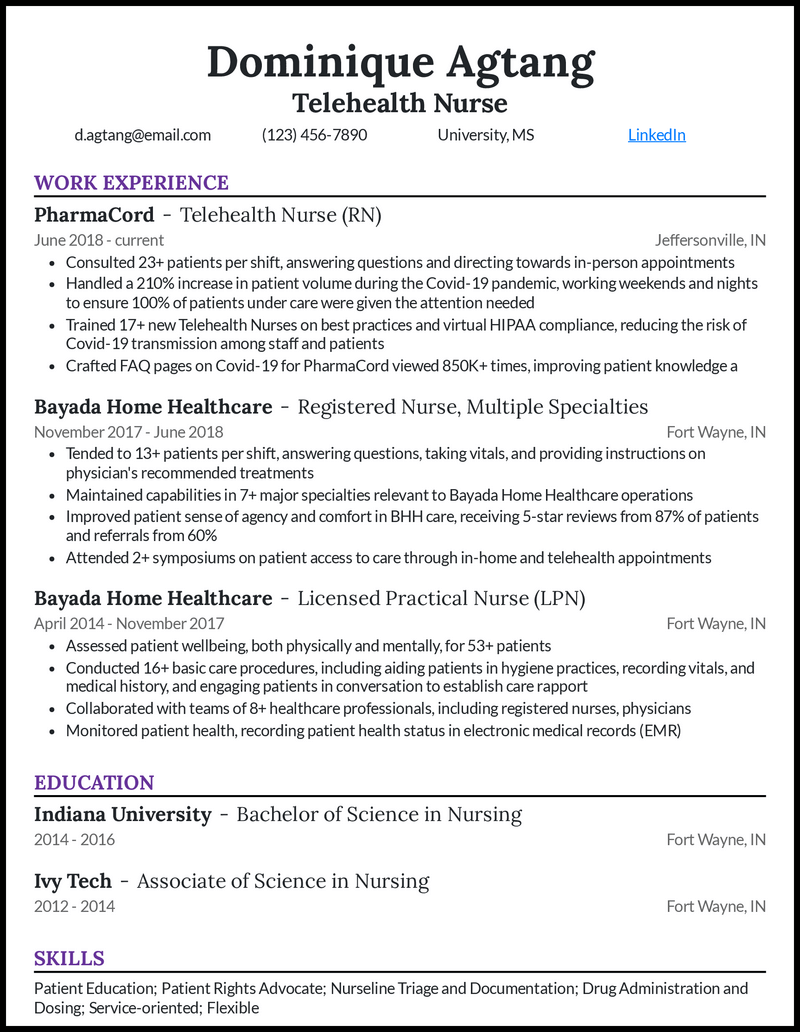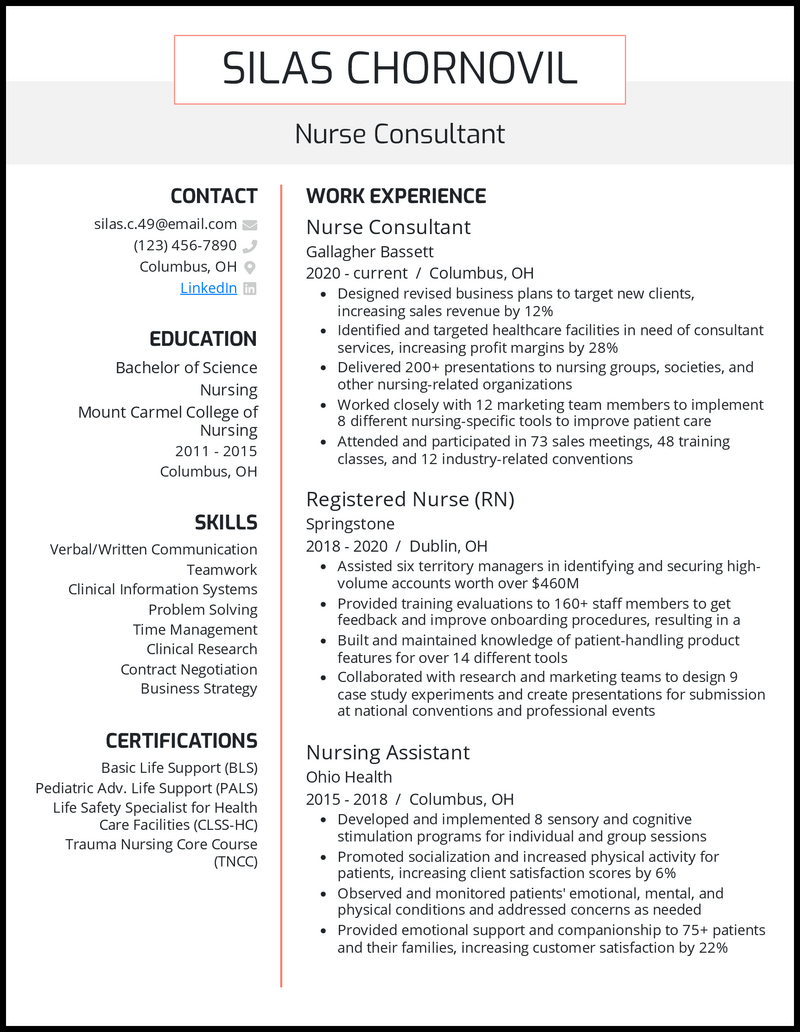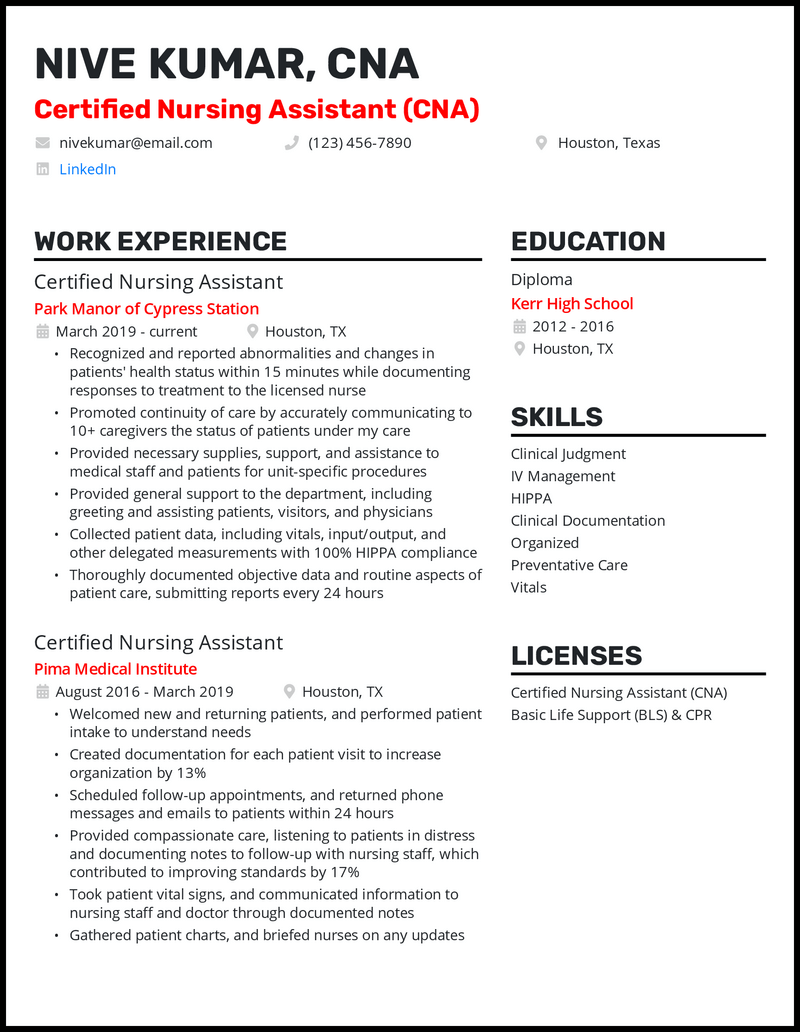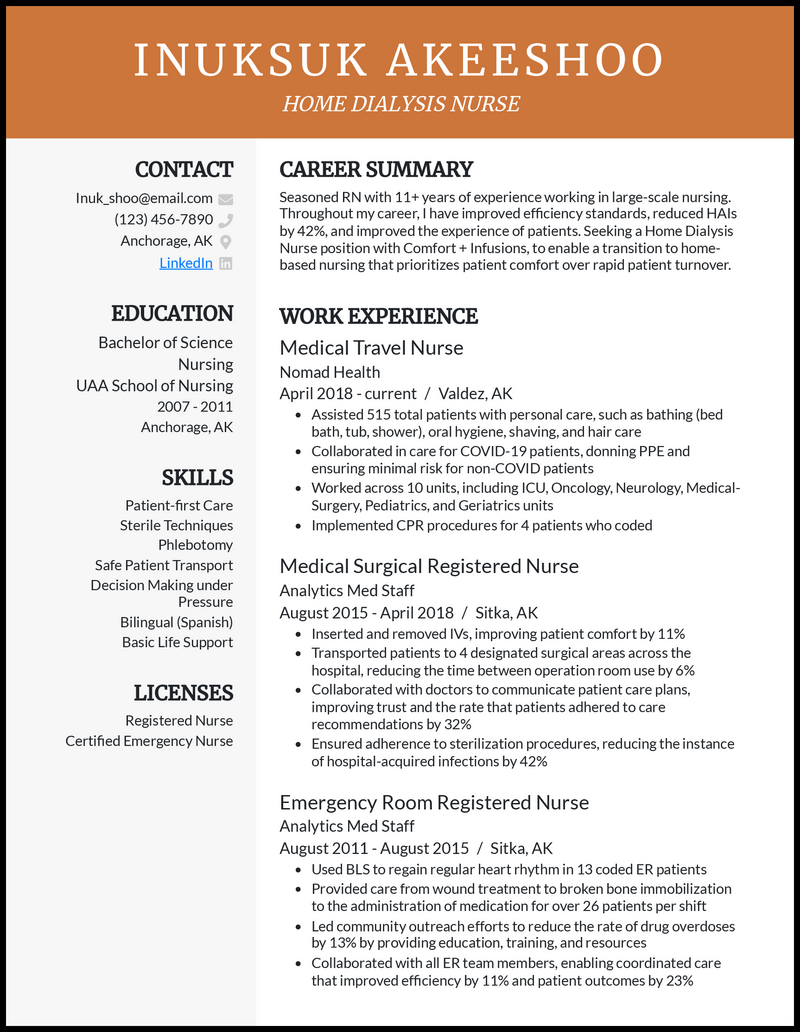
Nursing





Best for candidates with 3+ years of experience
Resume Builder
Like this template? Customize this resume and make it your own with the help of our Al-powered suggestions, accent colors, and modern fonts.
To write a nursing CV that secures interviews, focus on clarity, clinical outcomes, and qualifications in healthcare. Recruitment teams and applicant tracking systems (ATS) look for registration, certifications, and measurable impact in patient care.
Build your CV with clear, easy-to-read sections—using concise bullet points, standardised headings, and measurable achievements. Additionally, highlight tools you’ve used (like Epic, Cerner, or Pyxis), patient groups and numbers you’ve served, and how you improved safety, satisfaction, and efficiency. Your goal: ensure every line addresses a specific requirement the employer is looking for.
In this guide, you’ll find:
- ↪ 35 job-ready nursing CV samples tailored for every speciality
- A step-by-step guide on how to write a nursing CV
- ↪ Tips and expert strategies to stand out in 2026
Why this CV works
- Customise your nursing CV to the nursing job description. What keywords have they listed? What responsibilities do they expect you to fulfil? Use this as your guide to include what employers most want to see.
Why this CV works
- When writing your nursing student CV, you may encounter too much white space, which is an invitation to add a CV objective. While an objective is strictly optional, it’s a great way to convey your enthusiasm for the position and some of your relevant skills.
View more nursing student CVs >
Why this CV works
- Your biggest selling point should be your licences, starting with your RN accreditation. If you have any other licences, such as ALS and BLS, it’s high time you brought them forward and let recruiters know you have the validation to get the job done.
See more RN CVs >
Why this CV works
- Your CV skills section should match keywords mentioned in the job description as honestly as reflects your reality. For example, does the job description emphasise compassionate care? Then you should include the word “compassion” in your skills section.
Why this CV works
- When writing the work experience bullet points, use general responsibilities like “provided effective care”, but be specific about how you assisted your patients (and what resulted from your efforts).
View more ICU nurse CVs >
Why this CV works
- You need to format your CV to make it aesthetically pleasing and easy to read. The best format for nurses in 2026 is the reverse-chronological format since it shows how you’ve developed your skills over the years.
View more nurse practitioner CVs >
Why this CV works
- Are you skilled in using platforms specific to educational institutions, such as SchoolMessenger? Include them on your school nurse CV to demonstrate that you’re prepared to manage the workload.
View more school nurse CVs >
Why this CV works
- Use the career objective to present your clinical experience from the perspective of a neonatal intensive care unit by emphasising your ability to communicate with families or work in high-pressure environments.
View more NICU nurse CVs >
Why this CV works
- Highlight measurable achievements in your previous roles, emphasising how you assisted patients and improved outcomes (hint: reducing medication errors by 28% and enhancing patient safety).
Why this CV works
- As you gain more work experience, be selective about what you include on your CV. Your goal should be to keep your CV to one page, so space is valuable. Remember that you can go into more detail about achievements and skills in your nursing cover letter.
View more travel nurse CVs >
Why this CV works
- Certifications such as the Nursing and Midwifery Council (NMC) registration and the Certified Emergency Nurse (CEN) demonstrate that you’ve completed the necessary work and undergone the rigorous training required to be an A&E nurse.
View more A&E nurse CVs >
Why this CV works
- Start by using a CV template to format your information, then fill in the blanks with specific details about your past experience and skills.
View more charge nurse CVs >
Why this CV works
- If you’ve spent your time outside work organising events to promote women’s health and reproductive rights, it’s a powerful statement that shows your passion and commitment and deserves to be mentioned in your CV.
View more labour and delivery nurse CVs >
Why this CV works
- Including devices and software such as Hill-Rom smart beds, Omnicell, PeraHealth’s Rothman, and Vocera Badge shows employers that you’re fully prepared to get started and assist senior nurses in treating patients with the latest gadgets at your disposal.
Why this CV works
- Surgeons are always seeking state-of-the-art technology that can unlock new medical capabilities. Showcase your expertise in working with these innovative systems—like robotic arms—to enhance your theatre nurse CV.
View more theatre nurse CVs >
Why this CV works
- A Minnesota Nursing Assistant Certification and a Certified Home Health Aide (CHHA) licence catch the recruiter’s attention and demonstrate that you’ve met the required professional standards. They present a favourable image of a candidate who, at the very least, deserves an interview.
Why this CV works
- Try to demonstrate the various specific responsibilities you’ve had throughout your career. What kinds of clinical techniques have you undertaken? For example, have you assisted with ADLs, administered particular tests, or diagnosed specific types of illnesses?
Why this CV works
- By showcasing specialised skills or knowledge in medical tools and software in your nurse manager CV, you can significantly enhance your chances of impressing your next recruiter.
View more nurse manager CVs >
Why this CV works
- An extensive programme, such as a Bachelor of Science in Nursing, from a prestigious institution like Johns Hopkins University, for example, is a valuable addition to your paediatric nurse CV, demonstrating that you’ve learned from the best.
View more paediatric nurse CVs >
Why this CV works
- Enhance your telemetry nurse CV by including any special certifications that further qualify you for the role, such as Advanced Cardiovascular Life Support (ACLS).
View more telemetry nurse CVs >
Why this CV works
- Go beyond assisting patients and list all the times you’ve helped doctors treat a condition more swiftly or improved post-surgery recovery rates. Include how you’ve strived to support patients remotely during challenging times (if any), such as offering remote sessions during COVID-19.
Why this CV works
- To work as a lead critical care nurse, you don’t need to be an expert from the outset. Here, even small contributions from previous positions can make a significant difference. Use promotions and new roles with greater responsibilities, supported by achievements, to demonstrate that you’re ready to lead.
Why this CV works
- You know you’re in the big leagues when you’re creating a director of nursing CV. Accordingly, mention what recruiters love — complying with data protection regulations. Also, list all the different software you’re proficient in and how you’ve used each one from the start of your career.
Why this CV works
- If you have a master’s degree in nursing or healthcare management, make that the centrepiece of your education section. Otherwise, a bachelor’s degree does the job. Of course, don’t forget to add the institution’s name and the year you graduated.
Why this CV works
- Utilise a credible qualification such as a Registered Nurse (RN). This isn’t just another document that’s nice to have but proof of the determination and effort it takes to be a professional nurse, which further enhances your existing value.
Why this CV works
- Emphasise your job-relevant technical skills in your nursing informatics CV to show you’re in your element and deserving of a chance. This includes demonstrating relevant technical proficiency in tools such as Epic Systems, Quippe, Meditech, etc.
Why this CV works
- Start by thoroughly analysing the job listing and understanding the qualifications, skills, and requirements that align with your own experiences. Then, strategically weave those key elements into your CV.
Why this CV works
- CNOs must have management and finance experience, so focus on including hard skills. We recommend you include six to ten skills, with at least 70 per cent hard skills such as BLS, QA/QC, government compliance, and financial health analysis.
View more CNO CVs >
Why this CV works
- If you have a qualification higher than a secondary school certificate, omit your secondary school information as employers don’t require it. If you have multiple nursing qualifications, include all of them.
View more telehealth nurse CVs >
Why this CV works
- Highlight achievements such as “reducing 30-day readmission rates by 14%” and “raising awareness of mental health services among over 1,280 community members.” Make these successes stand out in your CV by using bold and underline to impress the recruiter right from the start.
Why this CV works
- Research the environment you’re applying to work in, and make sure you demonstrate why you’re a good fit for that specific role. After all, an A&E unit with high patient turnover may be much more interested in your high-efficiency standards than a home clinic that consistently deals with a much smaller patient load.
Why this CV works
- As a nurse consultant, you should highlight how you’ve developed relationships and enhanced team collaboration and communication. Use business-related figures such as sales growth or increases in revenue/profit to demonstrate your value as an employee.
View more nurse consultant CVs >
Why this CV works
- Much like applying for an RN role, you should include your licence right in your CV title (immediately after or below your surname). This effectively alerts the employer that you’re qualified for the role (and thus, deserve an interview).
View more CNA nurse CVs >
Why this CV works
- Adding a career summary to your CV can provide recruiters with the highlights, without overwhelming them with too much information. Make sure you start with your skills, experience, achievements, and career identity.
Why this CV works
- Connect your strengths by highlighting your technical abilities according to the nursing job description on your LPN CV. If your current specialisation is different from the job description, be specific about your experience, but focus on transferable skills that complement other fields.
View more LPN CVs >
How to Write a Nursing CV

Writing a nursing CV requires the right keywords, qualifications, and formatting elements to pass both recruiters and CV scanners. To stand out, you must tailor each section—from summary to skills to certifications—according to the job description and clinical setting.
Explore our CV templates and use our CV checker to optimise your document before you apply.
What we’ll cover in this section:
- What to include in a nursing CV (and why)
- How to craft a standout summary and work experience
- Which certifications, skills, and licences to include
- Examples of good and bad formatting
- Common mistakes nurses make on CVs (and how to avoid them)

What is a nursing CV?
It’s one of your most important documents when applying for a nursing position. It highlights your clinical skills and nursing work experience with quantified results, projects, placements, clinical rotations, education, qualifications, and a professional summary that explains to recruiters why you are suitable.
Now, let’s get into writing a CV that will land your dream nursing job.
It may sound like an impossible task, but before you get overwhelmed, start by taking it one step at a time. First, choose your formatting style: reverse-chronological, functional, or hybrid.

What should be included in a nursing CV?
A strong nursing CV should include:
- Concise summary
- Licensing and qualifications
- Clinical experience
- Hard and soft skills
- Educational qualifications
- Specialties such as ICU, paediatrics, or A&E
- ATS-compliant formatting with clear headings for work history, skills, and qualifications

What’s the right nursing CV format?
Use a reverse-chronological format if you have a solid work history; however, if you’re changing careers or have gaps, a functional or hybrid CV prioritises skills and education over experience. Opt for the one-column design that offers space for clear headings and uses standard fonts like Arial or Calibri for readability and ATS compatibility.
A well-structured CV is essential for your job search. Even if your CV has perfect content, if it isn’t easy to skim at a glance, it’s unlikely you’ll be called for an interview. Your content matters, but so does how you present that content. Therefore, proper CV formatting is a crucial feature you don’t want to get wrong.
There are three popular formatting options for designing your CV in 2026: reverse-chronological, functional, and hybrid.
- Functional format
- Focuses more on your skills
- Ideal for a recent graduate or a candidate at the beginning of their career
- Reverse-chronological format
- The most common format
- Lists relevant experiences and skills in reverse chronological order
- The best for getting through the ATS
- Hybrid or combination format
- Combines functional and reverse-chronological features
- Showcases both your skills and experience
- Ideal if you have a bit of experience or are returning to work
In conclusion, the best option for a nursing CV would be the reverse-chronological format. This helps the recruiter see your upward career progression. If you started as a trainee in a particular health organisation, and then moved up the career ladder to become a fully qualified nurse, your potential employer will be able to track your progression and assess your qualifications more quickly.

Add Contact heading
It’s important to include the relevant contact header information in the correct order. If you’re a nurse, your contact header should include the following:
- Your name—Employers won’t automatically know you, so you need to include your first and last name.
- Phone number—Use your personal mobile number instead of a work phone in case a potential employer calls when you’re not at work.
- Email address—Include a professional email address, preferably combining your first and last name.
- Town & county—This is optional but recommended so employers know if you’re local.
- LinkedIn—Some employers require your LinkedIn profile, but even if it’s not compulsory, it’s useful for employers to see your career progression.
The contact header should be, as you might expect, at the top of the page. Good font choices are Times New Roman, Arial, or Calibri, all at 12 point size. When it comes to colour, keep it conservative with black and white. Some CV templates can format your CV to strikingly display your contact information, just like this header:

Will your nursing CV pass the ATS?
Optimising your CV for the Applicant Tracking System (ATS) increases your chances of being called for an interview. The ATS is a tool that many companies use to quickly scan CVs and filter out applicants without relying on someone to read through them first.
Most CVs aren’t designed to get past ATS, and end up being filtered out before they ever reach the recruiter. However, if you know how to properly format your CV, you’ll pass the ATS scan and make your way to a person. Here’s what you should know about the role of fonts, font size, margins, header names, logical order, skills, and page length, as far as ATS-friendly CVs are concerned:
- ATS-friendly fonts make it easy for a computer to read your CV. Some of the most commonly used ATS-friendly fonts include: Times New Roman, Calibri, and Arial. Preferably, they should have a font size of 10-12 points.
- Beyond just font type, font size also matters. Ideally, your body font size should be 10-12 points, while your headings can be larger.
- Margins also matter, since the ATS automatically assumes your margins are the standard size of one inch all around. Any bigger or smaller, and the ATS might misread your CV.
- Keywords are the main focus of the ATS, so ensure your skill keywords, section titles, and LinkedIn headline match what’s in the job description.
- The ATS is not sensitive to the number of pages, but one page is the standard across professions.

How to create a stunning CV for a nursing career
Creating an effective nursing CV may seem daunting and not worth your effort. However, putting in the extra effort now will pay off when you secure an interview. And remember, you’re not doing this alone. We’re committed to helping you write an amazing CV by providing advice on common frustrating decisions like this:
- When an objective is most useful on your nursing CV
- When a summary might be the preferred option
- How to list your most relevant nursing work experience
- Including volunteer work and academic pursuits when work history is limited

Do you need an objective or summary on your nursing CV?
Use a summary if you have direct nursing work experience—it highlights the value you bring. Use an objective if you are at an entry level, changing careers, or have less than two years of experience.
An objective outlines your career intentions, while a summary showcases the proven value from years of experience.
Example comparison table:
| Type | Example |
|---|---|
| Objective | Entry-level nurse pursuing a pediatric role at Boston Children’s Hospital, leveraging clinical rotations, Epic EMR skills, and a passion for child-centered care. |
| Summary | Pediatric RN with 3 years’ clinic experience, boosted vaccination compliance by 18% using Epic EMR. Dedicated to long-term, family-centered pediatric care. |
When crafting your nursing CV, you have the option to use career objectives and summaries.
When to include a career objective in your CV
- You can use an objective when changing or modifying your career path.
- For instance, if you plan to change from a surgical assistant registered nurse to an A&E registered nurse, you’d use an objective to highlight that you’re pursuing a new subfield within nursing.
- Use a career objective if you’re seeking a graduate position and lack experience.
When a summary is right for your CV
- Use a summary to highlight your most valuable experience and skills. These are ideal when you have extensive experience in nursing.
- For example, if you’ve worked in a healthcare setting for 10 or more years, you can include a summary.
- A summary is effective for linking diverse work experiences.

How to measure and describe your nursing work experience
Don’t forget to indicate relevant experience in your CV. While we wouldn’t recommend including every job you’ve had since you were 16, you can include work experience from different fields if you’re a graduate or entry-level candidate.
However, if you’re applying for a senior position, you’ll need to include at least three nursing roles on your CV, especially if you’re applying for a managerial or specialist position. For instance, a director of care management requires nine years of experience, four of which must be in a managerial capacity.
On the other hand, a registered nurse position may require one year of direct patient care. The responsibilities, in this case, are not very demanding. If you lack experience overall, you can include any academic projects and voluntary work that is relevant to the nursing job description.

How to write your job experience bullet points for your nursing CV
Three examples of poor job experience bullet points for nurses:
- I have eight years of experience in nursing
- Generally, you should avoid using “I,” and you should include specifics, not just general statements of experience.
- I joined the hospital in May.
- This bullet point includes “I” and lacks job details and measurable metrics.
- I have provided compassionate care for all my patients.
- While it might sound appealing at first, it doesn’t precisely explain what the patient did or the outcomes of their work.
Three examples of good job experience bullet points for nurses:
- Provided a wide range of services to a caseload of over 50 patients
- This uses an action verb combined with measurable metrics.
- Led four new primary care training initiatives for over 60 nurse recruits
- This also uses an action verb, but moreover, it specifies exactly what the candidate delivered (primary care training).
- Supervised patient safety in the healthcare facility by developing risk reduction measures in the unit
- Specific, relevant job duties demonstrate your skills to employers and can also help you get past the ATS; top marks for this one!

How to measure your impact as a nurse
When preparing your CV, remember that no employer wants to waste time reading vague statements about your performance. Instead, they want to see supporting details. So, whenever you can, you should quantify your impact and achievements.
For example, if you say you “attended to numerous patients daily,” a potential employer might question the exact number because ‘numerous’ is a relative term.
Examples of how to quantify measurements:
Suppose the nursing job description asks for a training specialist who can train other nurses. In that case, you can indicate the number of training sessions you conducted per day in your previous employment.
- Number of clinical training sessions per day
- Trained 75% of new starters on pre- and postoperative care for over 20 days per month
Some of the health facilities labour under tremendous pressure. The number of patients you attend to per day can help potential employers gauge whether you will cope well under pressure. Therefore, it’s beneficial to include the number of patients you dealt with over a specific period of time.
- Number of patients seen in a day
- Worked in an environment with a 6:1 patient-nurse ratio, receiving over 400 visitors per day

How to highlight clinical experience effectively
Generate 3-4 bullet points under each entry of your work history or clinical placements to describe specific tasks, patient volumes, and outcomes. Make the points stand out with metrics and action verbs like “coordinated,” “monitored,” or “administered.”
For instance:
- Provided care to over 15 patients per shift in a 32-bed ICU using Epic EMR and advanced monitoring tools.
- Assisted in 24 surgical procedures during perioperative placement with sterile technique and electronic record-keeping
- Reduced patient discharge time by 45 minutes through coordinated care and accurate documentation in Cerner EMR.

How to write a nursing CV with no experience
If you’re a recent graduate, fresh from a placement, or transitioning into nursing, focus on:
- Clinical placements
- Voluntary experience
- Work placement
- Transferable skills (communication or teamwork)
- Nursing degree (include your grade if it’s above a 2:1)
- Healthcare-specific qualifications
- A professional summary highlighting your value

Highlight top skills for your nursing CV
It’s helpful to understand the differences between hard and soft skills to list in your CV skills section. Keep the number of skills you list between six and ten to avoid overwhelming the reader.
Hard skills are the tools you use to perform the job, also known as technical abilities that require training.
Examples of technical skills:
- ERM systems
- Medical documentation
- Baby and child care
- A&E care
- Outpatient care
- CPR certified
Conversely, soft skills are abilities that are more difficult to measure and are more personality-based.
Examples of interpersonal skills:
- Communication
- Patience
- Empathy
- Professionalism
- Positive outlook
- Integrity
- Compassion
Get noticed! Look for keywords within a job advert:
- Many companies use ATS to scan CVs for keywords from the job description, so it’s in your best interest to include the right keywords.
- Include keywords in both your nursing cover letter and CV.
- Choosing keywords from the job description helps you tailor your CV and thus, makes you more appealing to the hiring manager.
- Using the right keywords makes your CV relevant and noticeable, giving you an advantage over the competition.

How to include nursing education and qualifications
When preparing your nursing CV, include all the elements that will increase your chances of getting the job. You need to indicate the following:
- Your level of education
- Any certifications or licences
- Your experience in other nursing settings
- Your years of experience as a nurse
On the topic of licences, you need to share your area of specialisation. Specialists include registered nurses (RNs), certified registered nurse anaesthetists, and clinical nurse specialists. Including your area(s) of expertise helps potential employers determine whether you’re the right candidate for the role.
Certifications that enhance a nursing CV
Common qualifications include:
- BLS (Basic Life Support)
- ALS (Advanced Life Support)
- PALS (Paediatric Advanced Life Support)
- TNCC (Trauma Nursing Core Course)
Include the certifying body (e.g., AHA) and expiry dates in a dedicated section near the top of your CV.

Should you add projects, interests, or hobbies to your nursing CV?
Most of the time, you don’t need to include projects or interests/hobbies on your CV. However, you might be able to add them depending on your level of experience and the type of role you’re seeking.
If you’re an experienced nurse, you’ve likely gained practical experience that’s more important than any undergraduate projects you’ve completed. Instead, you should emphasise your key areas of experience and demonstrate to your new employer how you’ll make a difference to their organisation.
Similarly, you may not need to mention your hobbies or interests unless it’s encouraged. However, you can gain an advantage over the competition if you have strong qualifications and hobbies that align with the company culture.
To help you decide whether to include hobbies, visit the company’s website and read the “About Us” section to assess whether they have a unique cultural fit.
If you’re a candidate just starting out or a recent graduate, listing hobbies and projects can help you fill space and showcase your personality. However, it’s always good to review the job description to ensure these additions are relevant. Either way, keep the project and hobbies lists short and at the bottom of your CV.
Examples of hobbies/interests:
- Volunteering for community health services
- Exercise
- Learning new languages
Examples of projects:
- Organised and led breast cancer awareness campaign for two consecutive terms
- Researched mental and psychiatric issues for term-long experiment

Tips for new graduate nursing CVs
As a recent graduate, begin with your education and clinical placements. Capture attention from the start with a strong objective, and then highlight your nursing coursework, practical procedures from projects, placements, and any externships. Mention your NMC registration status if applicable (e.g., “NMC registration scheduled for Oct 2026”). Additionally, show your initiative through volunteer experience or membership in nursing associations.

How to tailor your CV for specific departments
Review the job description to identify relevant experience and match the department’s needs. Align your summary, skills, and experience with the department’s daily tasks.
For:
- Intensive Care Unit: Emphasise critical care, ventilators, and emergency response
- Paediatrics: highlight child development knowledge, family communication, and vaccination protocols.

Should you include a covering letter?
Yes, particularly in healthcare, a cover letter is an asset that allows you to demonstrate your suitability for the role and the patients you’ll be looking after. Keep it concise, focused on why you’re a good fit, and in line with the employer’s mission. For inspiration, explore these nursing cover letter examples and start working on yours.

Common nursing CV mistakes to avoid
Avoid any of these mistakes:
- Using generic phrases such as “hard-working” and “team player”
- Not tailoring for each job and organisation you’re targeting
- Placing licences or certificates lower on the list of priorities
- Dense paragraphs that are difficult to read
- Including outdated information from previous, unrelated roles, inactive contact details

Confidently secure your next Nursing role
Many job seekers struggle in the job market, especially given the number of nursing graduates produced by universities each year and the intense competition. Therefore, you need to be creative and astute to navigate the market successfully. Fortunately, you’ve already taken the first steps by reading this guide, so well done!
We know you’ve worked hard to get this far, and we wish you all the best as you write a compelling nursing CV and prepare for interviews in 2026!
Nursing CV FAQs

A nursing resume that wins the job leads with clinical experience backed by quantifiable achievements from relevant roles and niche certifications.
Ensure these core sections are present:
Contact details (name, phone, email, LinkedIn)
Professional summary tailored to the specific nursing role
Licensure & certifications specific to healthcare
Clinical experience backed by metrics
Education (degree, institution, graduation year)
Specific skills aligned to the job
Yes — a CV is essential for any nursing job application. It’s your first opportunity to present your qualifications and stand out in a competitive field. Recruiters and potential employers expect it. Even for hospital-based roles or internal transfers, a clear, structured CV is the ticket you need to pass ATS for your application to be reviewed by hiring managers.




